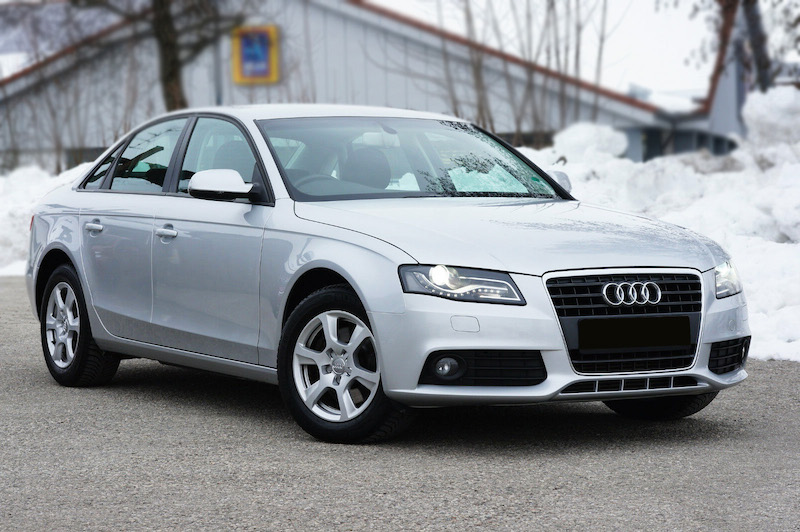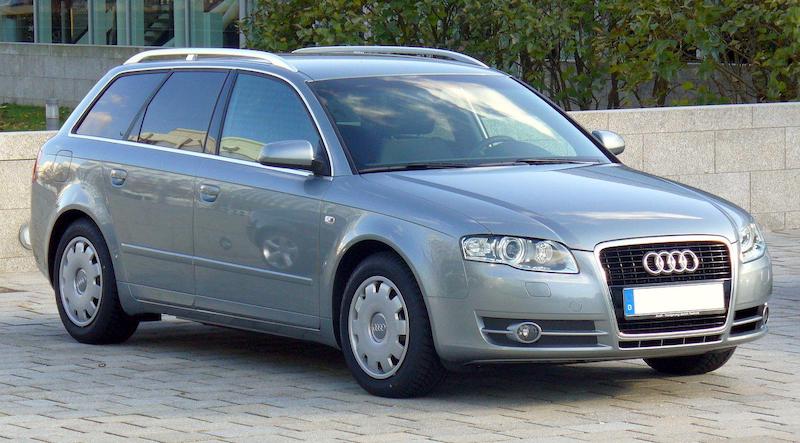Get ready for a wild ride as we dive into the problems, weak points, and buying advice for the Audi A4. This mid-size sedan has had its ups and downs over the years, and we’ll be taking a closer look at the B7, B8, and B9 models. From increased oil consumption to worn camshafts, we’ll be exploring the most common issues with the gasoline and diesel engines, as well as the infamous Multitronic transmission. So buckle up and get ready for a bumpy ride as we navigate the world of Audi A4 ownership.
A4 B7 (Type 8E) | 2004 – 2008
The Audi A4 B7 (Type 8E) is a sedan from the mid-size segment and was produced from 2004 to 2008. Officially, there was a small facelift in mid-2006, which mainly affected the interior. Audi marketed the B7 as its successor, as it brought with it a revised engine range as well as technical innovations. For many, however, the B7 is merely a B6 facelift.
Known weak points in the gasoline engine
Increased oil consumption can occur with the 1.6 and 2.0, although this can be halved with regular engine flushing and the right oil. Furthermore, the 1.6-liter naturally aspirated engine with the engine code letter ALZ is known for premature catalytic converter wear. Meanwhile, the crankcase ventilation in the 2.0 is more likely to go bye-bye – a defect usually announces itself with slightly increased consumption and rough idling.
In the 1.8T, oil sludge can form due to late oil changes, which clogs the oil strainer and prevents oil pressure from building up. In the worst case, this can lead to engine damage.
The 2.0 TFSI also frequently has problems with high oil consumption and clogged oil screens. Engines with the code letter BGB (installed from November 2004 to August 2005) can also suffer from piston cracking. The successor with the engine code letter BWE is no longer affected by this problem. The engine code letter can be found in the service booklet, on the vehicle data carrier or on the engine block.
The V6 engine in the 3.2 FSI is known for piston skidding. Increased oil consumption and sudden loss of power are the first signs of this. You can also hear loud, clicking noises from the engine.
Tip: A longlife oil change interval of 30,000 km has been specified for the A4 B7 and is the main cause of most engine-related problems. Depending on the driving profile, it is advisable to change every 10,000 – 15,000 km.
Typical problems with diesel
In the 2.0 TDI, a worn hexagonal shaft in the oil pump drive can cause an oil deficiency, resulting in a capital engine failure. The V6 diesel engine in the 2.5 TDI often has problems with worn camshafts.
The injectors of the older V6 units in the 3.0 TDI are often subject to needle seat wear, as a result of which they no longer close completely, causing fuel to drip permanently into the cylinder. The problem can only be solved with an expensive replacement of the injectors (250~300€ per piece), but should provide permanent peace.
On top of that, repairs on all V6 diesel engines can be very expensive, as the complete engine may have to be removed due to lack of space (e.g. to replace the timing chain).
Note: The 2.7 TDI and 3.0 TDI models are affected by the diesel scandal. As part of a recall campaign, a software update was performed on the affected vehicles, which can cause the EGR valve to wear prematurely. A defect usually announces itself with black exhaust smoke, engine judder, increased fuel consumption and reduced engine performance.
Beware of the Multitronic Transmission
The Multitronic transmission is known for a number of problems, ranging from jerkiness when starting and speed fluctuations to transmission failure. If it has to be an automatic transmission, it is advisable to go for the Tiptronic transmission.
This is a classic 6-speed torque converter automatic that rarely causes trouble. However, since this transmission is only available in combination with the Quattro all-wheel drive, you are on the safe side with the manual transmission in case of doubt.
Other weak points are the wishbones and tie rod ends, which tend to pop out more often. Rust can also form on the tailgate and door edges.
The basic problems of the Multitronic and when this transmission is recommended, we have summarized for you in detail in our guide.
According to the 2008 TÜV report, defective steering gears were occasionally reported. The wheel bearings on the rear axle regularly fail, while porous brake hoses rarely catch the eye of the inspectors. The A4 B7 did not attract any attention in the ADAC breakdown statistics.
Our tip: go for gasoline engines with manual transmission
The naturally aspirated 1.6 and 2.0 gasoline engines are not faultless, but they are the most stable engines in the series. However, the former is overwhelmed with the weight of the car most of the time and accordingly slow. If you want more power and can live with slightly higher consumption, it’s better to go for the 1.8T or 2.0T.
If you’re looking for a reliable diesel, there’s no getting around the legendary 1.9 TDI. If it is to be a V6 model, the 2.7 TDI is recommended because of the comparatively low failure rates and rather minor problems.
Before buying a 2.7 TDI or 3.0 TDI, it is essential to make sure that the necessary software updates have already been carried out in the wake of the diesel emissions scandal. Anyone who does not have a software update carried out risks having the vehicle decommissioned.
Audi A4 B8 (Type 8K) | 2007 – 2015

The Audi A4 B8 (Type 8K) was produced from 2007 to 2015. There was a facelift in November 2011.
High oil consumption in the 1.8 TFSI, 2.0 TFSI
The 1.8 TFSI and 2.0 TFSI use the EA888 gasoline engine, which was already used in the A4 B8. This engine series is known above all for its very high oil consumption: defective pistons and piston rings mean that almost two liters of oil have to be topped up after around 2,000 kilometers. As part of a large-scale service campaign (TPI 2), improvements have been made to the affected models (up to around year of manufacture 2012).
The EA888 also suffers from soot and carbon deposits in the intake tract and combustion chamber, which also affects injectors. This increases consumption and reduces performance. This is a general problem with engines with direct injection and is therefore found with many other manufacturers.
In the case of the 3.0 TFSI, the thermostat was replaced as part of a service campaign. Poor maintenance and many short trips can also cause the timing chain to become elongated and skip. In most cases, this results in engine damage.
A leaking water pump is not uncommon in the A4 B8 and often has to be replaced after just 50,000 – 100,000 kilometers.
Solid diesel despite cheating software
The 2.0 TDI causes the fewest problems in the long run. The dual-mass flywheel may need replacing sooner or later, and attention should also be paid to general weak points such as injectors and turbochargers. Furthermore, defective intake manifold flaps on the 3.0 TDI can lead to rough engine running.
Both the four-cylinder and V6 diesel engines are affected by the emissions scandal (EA189, EA288, EA897). If you are considering buying a diesel model, you should make sure that the necessary software updates have already been carried out.
Multitronic or S-Tronic?
Due to the problems mentioned above, the Multitronic transmission should be avoided. At the end of the B8 series, these problems were somewhat solved, but never completely eliminated. This could also be one of the reasons why Audi parted with the Multitronic in 2015 and relied only on the S-Tronic dual-clutch transmission for its successor, the B9. In the B8, this remains reserved for the Quattro all-wheel-drive model.
Despite its significantly improved reliability, the S-Tronic is not spared weak points: As with the manual transmission, the clutch can wear out sooner or later. If you spend a lot of time in traffic jams or with a heavy trailer, you will have to replace the clutch more often. When test driving, make sure that the transmission engages gears cleanly and that the clutch does not pick or jerk when starting off.
We have summarized further tips that contribute to the longevity of the dual-clutch transmission in our guide.
Other weak points
Occasionally, a knocking noise can be heard from the exhaust system area. The reason for this is more often a loose heat shield.
The clutch on the manual transmission tends to pick up.
In some cases, strong vibrations in the steering wheel have been reported when parking/maneuvering.
According to the TÜV report, the axle suspensions are more frequently criticized, while the suspension springs and shock absorbers are less frequently criticized. In addition, the lighting and brake hoses occasionally give the inspectors cause for complaint. In the ADAC breakdown statistics, the A4 B8 is consistently in the green zone.
Recalls
The Audi A4 B8 has been recalled several times. All recalls are listed below, affecting a large number of vehicles:
In some circumstances, the auxiliary coolant pump may be blocked by foreign particles in the coolant. B8 models from the production period 2011 to 2016 are affected.
According to the KBA, incorrect parameterization can lead to the front airbag not deploying. Models built between 2011 and 2014 are affected.
Furthermore, contact corrosion on the plug connection of the auxiliary heater can lead to scorching. Models from the production date of 15.03.2011 are affected.
In 3.0 TDI models that rolled off the production line between March and December 2012, oil can penetrate the brake booster and impair its function.
The diesel emissions scandal affects the entire model series (see above).
Due to a leak at the fuel distributor, fuel may escape under certain circumstances. B8 models from model year 2013 are affected.
Tip: Detailed information on the recall campaigns can be obtained from the KBA or ADAC. To do this, you can use the vehicle identification number (VIN) to find out whether the model in question is affected by recalls and which actions have already been carried out.
Our tip: 2.0 TDI with manual transmission
The Audi A4 B8 has to contend with some annoying problems that really needn’t have been there: both the high oil consumption of the gasoline engine and the diesel scandal leave a bad taste in the mouth, even though the model series can be described as thoroughly successful.
Basically, you should go for a younger model that already has a large part of its teething troubles behind it. For a well-maintained facelift model with low mileage, you need to budget around 20,000 euros on the usual used car exchanges, the cheapest examples cost around 6,000 euros.
A4 B9 (Type 8W) | since 2015
The fifth generation of the Audi A4 (B9 8W) has been in production since 2015. The facelift followed in May 2019

Stable engines with few shortcomings
There is no longer any need to worry about the durability of the gasoline engines, at the latest since the facelift. Provided that the service intervals have been observed and the previous owner has not only driven short distances, neither a 1.4 TFSI nor S4 should cause serious problems.
According to SWR, older 2.0 TDI models with the Euro-6 emissions standard (EA288 engine series) are said to be affected by the diesel scandal. However, it remains to be seen at this point whether this is actually the case. Those who want to be on the safe side should therefore opt for a younger model with the Euro 6d-TEMP emissions standard.
In the 3.0 TDI, the camshafts can suffer a defect due to a material defect. Affected are engines of the EA897 EVO series with the following engine numbers: CRT 000001 to 073951.
Other weak points
The aero trim on the rear window has become detached on some early models, but the affected models were quickly rectified as part of a service campaign.
With the S-Tronic dual-clutch transmission, jerking can be perceived more frequently in “D” and “R” gears when idling. The problem has not yet been solved and has always been dismissed by Audi as “state of the art”.
According to TÜV, the axle suspensions are occasionally criticized, less frequently the lighting. The Audi A4 B9 performs well in the ADAC breakdown statistics.
Recalls
The Audi A4 B9 has been recalled several times. All recalls are listed below, affecting a large number of vehicles:
The aluminum decorative trim with Bang & Olufsen lettering in the door panel area can detach, causing the trim to stick out and result in injury to occupants due to sharp edges. A4 Avant and Allroad models from the production period October 2014 to October 2017 are affected.
A4 models built up to 2018 may experience fuel leakage due to leaks at the fuel distributor.
A defective locking bolt can lead to the loss of the attached vehicle. The model years up to 2018 are affected. As part of the workshop visit, the towbar will be checked and replaced if necessary.
Due to moisture ingress into the belt starter alternator, a short circuit may occur resulting in a fire. The model years 2017 to 2020 are affected.
A4 models built from 2019 to 2021 have not had wheel alignment performed, which can cause severe wear on the rear tires.

